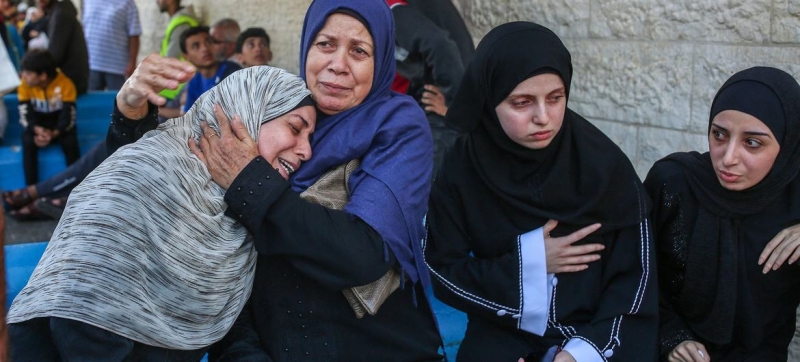
Palestinian women in Gaza. Middle East: Escalation of crisis in Gaza, Lebanon and Syria Peace and security
Israeli bulldozers yesterday seriously damaged the office of the UN Refugee Agency (UNRWA) in the Nur Shams camp in the West Bank, UNRWA chief Philippe Lazzarini said.
According to him, the center provided basic services, including education, health care and social protection, to more than 14,000 Palestinian refugees. The building is unusable due to damage.
Vaccination campaign in Gaza
Meanwhile, the World Health Organization (WHO) and the United Nations Children’s Fund (UNICEF) said on Friday that the third and final phase of the second round of polio vaccinations will begin tomorrow in northern Gaza “after it was postponed from October 23, 2024, due to intense bombing and mass evacuation orders, lack of access and the guarantee of comprehensive humanitarian pauses.”
“The campaign, which is being run by UNRWA, WHO and UNICEF, is to vaccinate 120,000 children who remain in the north of the enclave and who require a second dose of polio vaccine,” UNRWA spokeswoman Louise Wateridge told UN News Service.
According to WHO and UNICEF, the humanitarian pauses will be extended by two hours and are expected to be observed from 6am to 4pm daily. As in the first two phases, children aged two to 10 will also be offered vitamin A to boost their overall immunity. The first two phases of the second round have been successfully completed in central and southern Gaza, with 451,216 children vaccinated, or 96 percent of the target in these areas.
Read also:
Middle East: Humanitarian catastrophe unfolds in northern Gaza
Wateridge warned that polio was just one of the threats Gazans face after more than a year of intense fighting. “The situation in northern Gaza right now is an absolute disaster,” she added.
Destruction of cultural sites in Lebanon
The UN Human Rights Office (OHCHR) has expressed alarm at the damage that the Israel Defense Forces (IDF) military operations continue to cause to civilians and infrastructure in Lebanon, including the destruction of sites of religious, cultural and historical significance.
According to a statement by the OHCHR, at least 10 religious buildings have been destroyed or seriously damaged in Israeli airstrikes since October 6, 2023.
In recent days, fighting in Baalbek in the Bekaa Valley has come dangerously close to an ancient temple complex that is listed as a UNESCO World Heritage Site, the report said.
Under international humanitarian law, religious buildings and other sites of cultural significance are civilian objects and are protected from attack unless they are being used for military purposes. Once they lose their protection, any attacks on them must still comply with the principles of proportionality and precaution.
Mass evacuations
The UN Office for the Coordination of Humanitarian Affairs (OCHA) warned on Friday that some 50,000 people had fled Baalbek in eastern Lebanon over the past few days.
Speaking in Geneva, OCHA spokesman Jens Laerke said the number of displaced people had skyrocketed to more than 842,000 as a result of repeated displacement orders issued by the Israeli military and subsequent airstrikes, more than half of whom were women and girls.
More than 11,600 pregnant women have been affected by the escalating bombing, the United Nations Population Fund (UNFPA) said. Many have been forced to flee their homes and take refuge in shelters for weeks or months, leaving them with no financial means to seek medical care, said UNFPA staff member Pamela Di Camillo.
Syria crisis
Syria is being drawn into a regional conflict, members of the Independent International Commission of Inquiry on the Syrian Arab Republic said today.
A dramatic escalation has led to the latest displacement of more than 300,000 Syrian refugees, this time fleeing Israeli bombing from Lebanon. Along with more than 100,000 Lebanese citizens, they fled to Syria, which itself is experiencing a humanitarian and economic crisis and is increasingly subject to Israeli airstrikes.
“The fact that Syrians who have well-founded fears of persecution in their home country are fleeing back highlights the impossible choice they must make: risk their lives against bombs in Lebanon or return to a place where they too may face deadly threats?,” said Commission President Paulo Sérgio Pinheiro.
